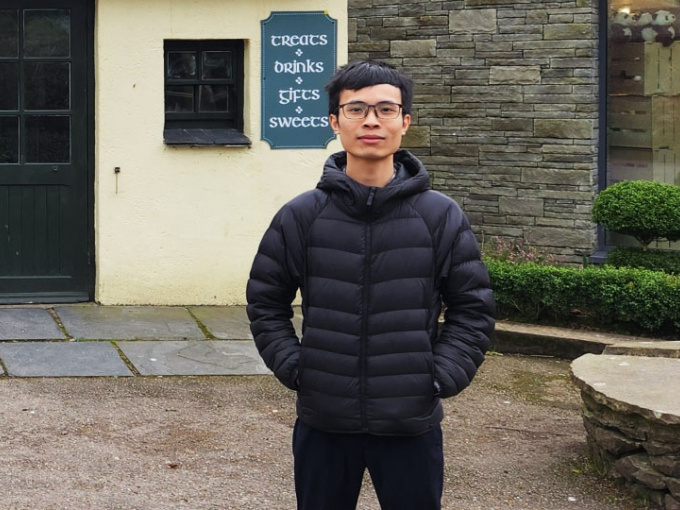 Minh Hieu Nguyen, MA Applied Linguistics, Department of English Language and Literature
Minh Hieu Nguyen, MA Applied Linguistics, Department of English Language and LiteratureMinh Hieu Nguyen graduated with an MA in Applied Linguistics from Mary Immaculate College, Limerick, in 2024. He is currently an ESRC-funded PhD candidate in the Department of Linguistics and Communication at the University of Birmingham, United Kingdom.
What did you study as an undergraduate and postgraduate?
At the undergraduate level, I read for a BA (Hons) in English (Translation & Interpreting) at the University of Languages and International Studies, Vietnam National University, Hanoi. Graduating with excellent academic performance, I received the Government of Ireland International Education Scholarship (GOI-IES) to pursue my MA in Applied Linguistics at Mary Immaculate College, University of Limerick, Ireland. At MIC, I developed a keen interest in corpus linguistics and corpus-assisted critical discourse studies.
To diversify my skill set, I pursued an MSc in Computer Science with Cybersecurity at Abertay University, Scotland. This programme equipped me with fundamental technical and programming skills, which I consider highly beneficial for my computational language analysis. Currently, I’m a PhD candidate in the Department of Linguistics and Communication at the University of Birmingham, supported by the UKRI Economic and Social Research Council (ESRC) studentship through the Midlands Graduate School Doctoral Training Partnership.
Tell us a bit about your research
I am an applied linguist whose research interests include Corpus Linguistics, Critical Discourse Studies, and Translation Studies. I use methods from Corpus Linguistics to analyse language patterns across different genres, author categories, and contexts. My corpus-based studies centre on lexico-grammatical features of discourse, such as evaluative language and formulaic expressions, used by people to achieve their communicative purposes. These features reveal how language use reflects and is influenced by the intricate interplay of genre conventions, language systems, discourse community practices, and socio-cultural contexts, among other things. The insights gained carry important implications for communication across contexts, especially in the increasingly interconnected world.
Critical Discourse Studies is another cornerstone of my research, in which I explore how media outlets use multimodal resources to construct representations of marginalised social actors and social problems. Most of my discourse analysis projects deal with Vietnamese-language media in Vietnam in an attempt to redress the Western-centric scholarship. By revealing how language and images reinforce underlying ideologies and power relations, my research can inform more responsible media practices, enhance public understanding of social issues, and ultimately contribute to a better society. In addition, I incorporate experimental methods to test hypotheses informed by discourse analysis to deepen the understanding of the interplay between language and social dynamics.
With several years of professional experience in specialised translation and localisation, I also have a keen interest in Translation Studies. From a corpus-based perspective, my research projects delve into English-Vietnamese translation products. For example, I am interested in descriptively analysing translator styles, features of translational language, and procedures/techniques for rendering taboo language, culture-specific terms, and neologisms. My research also extends to translation quality assessment and the implications of machine translation technology, especially in the age of AI.
What do you enjoy most about undertaking your research projects?
What I enjoy most about my projects is their potential contributions to the field. Internationally, corpus-assisted critical discourse studies have, in the main, skewed towards the textual dimension of discourse. Other meaning-making resources, like images, have either received less scholarly attention or been manually analysed on a small sample. Hence, my studies often look into how large corpora of texts and images work together to reflect and shape public perceptions of marginalised groups and social problems. By uncovering the ideologies and social dynamics behind the discourses, I hope to raise awareness of problematic language and image use, thereby helping to avoid patterns that implicitly reinforce harmful behaviours or actions towards certain groups or issues. Ultimately, this contributes to a healthier, more equitable, and inclusive society where everyone is respected and social issues get the attention they deserve.
Locally, applied linguistics scholars in Vietnam mostly focus on TESOL and English Language Teaching. This emphasis is understandable, given the role of English as a lingua franca and the context of teaching and learning English in the country; however, it means other areas of research, like corpus-assisted critical discourse studies, are disproportionately overlooked. While some Vietnamese applied linguists, media, and communication researchers have recently started to embrace a corpus-based approach to critical discourse analysis, they usually resort to English corpora. Therefore, I want to set myself apart by focusing on Vietnamese discourse. By demonstrating the methodological rigour of corpus linguistic techniques (e.g., keyword, collocation, and concordance analyses) in the study of Vietnamese discourse, my projects are expected to lay the groundwork for similar research in Vietnam.
Do you have any advice for someone considering taking up a postgraduate programme by research?
I’d say my advice is to be strategic. People pursue postgraduate research degrees for different reasons - some want to enter academia, others to advance in industry, or simply to satisfy their curiosity. The key is to be clear about your personalised goals, make a strategic plan to achieve them, and take full advantage of your university’s resources. I also recommend seeking guidance from supervisors, friends, and others who understand your research and can offer advice. By doing so, you can navigate challenges more effectively and avoid feelings of imposter syndrome. At the end of the day, everyone’s journey is different, so just stay focused on your strategic goals and chart your own path.



